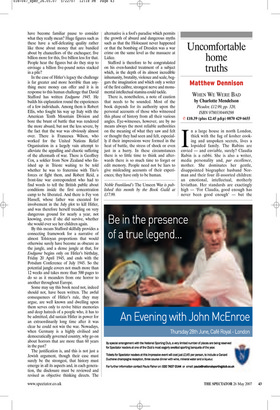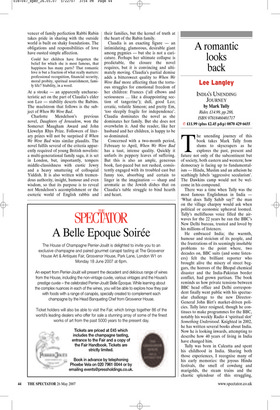Uncomfortable home truths
Matthew Dennison
WHEN WE WERE BAD by Charlotte Mendelson Picador, £12.99, pp. 320, ISBN 9780330449298 ✆ £10.39 (plus £2.45 p&p) 0870 429 6655 In a large house in north London, thick with the fug of kosher cooking and unspoken secrets, lives a lopsided family. The Rubins are envied — and enviable, surely? Claudia Rubin is a rabbi. She is also a writer, media personality and, par excellence, mother. She dominates her gentle, disappointed biographer husband Norman and their four ill-assorted children: an emotional, intellectual, motherly leviathan. Her standards are exactingly high — ‘For Claudia, good enough has never been good enough’ — but the veneer of family perfection Rabbi Rubin takes pride in sharing with the outside world is built on shaky foundations. The obligations and responsibilities of love have ousted simple affection.
Could her children have forgotten the belief for which she is most famous, that happiness has many parts? That romantic love is but a fraction of what really matters: professional recognition, financial security, moral probity, spiritual nourishment, family life? Stability, in a word.
At a stroke — an apparently uncharacteristic act on the part of Claudia’s elder son Leo — stability deserts the Rubins. The maelstrom that follows is the subject of When We Were Bad.
Charlotte Mendelson’s previous novel, Daughters of Jerusalem, won the Somerset Maugham Award and John Llewelyn Rhys Prize. Followers of literary prizes will not be surprised if When We Were Bad wins similar plaudits. The novel fulfils several of the criteria apparently required of young British novelists: a multi-generational family saga, it is set in London, but, importantly, tempers middle-classishness with exotic Jewry and a heavy smattering of colloquial Yiddish. It is also written with tremendous authority, insight, humour and even wisdom, so that its purpose is to reveal not Mendelson’s accomplishment or the esoteric world of English rabbis and their families, but the kernel of truth at the heart of the Rubin family.
Claudia is an exacting figure — an intimidating, glamorous, desirable giant among pygmies — but she is not a caricature. Perhaps her ultimate collapse is predictable, the closure the novel requires, but it is convincing and ultimately moving. Claudia’s partial demise adds a bittersweet quality to When We Were Bad more affecting than the tortuous struggles for emotional freedom of her children: Frances (‘all elbows and seriousness ... like a disappointing section of tangerine’); dull, good Leo; erratic, volatile Simeon; and pretty Em, ‘too sleepily fragile for independence’. Claudia dominates the novel as she dominates her family. But she does not overwhelm it. And the reader, like her husband and her children, is happy to be so dominated.
Concerned with a two-month period, February to April, When We Were Bad has a taut, intense quality. Quickly it unfurls its peppery leaves of suffering. But this is also an ample, generous book, fast-paced but not rushed, consistently engaged with its troubled cast but funny too, absorbing and certain to linger in the imagination — sharp and aromatic as the Jewish dishes that on Claudia’s table struggle to bind hearth and heart.



















































































 Previous page
Previous page